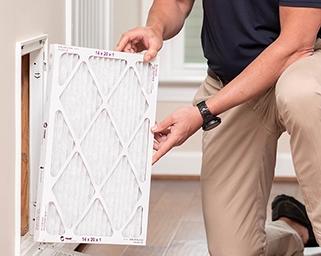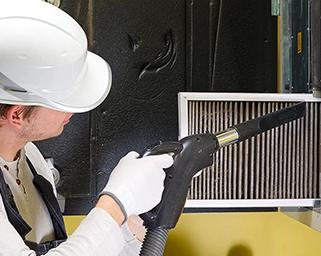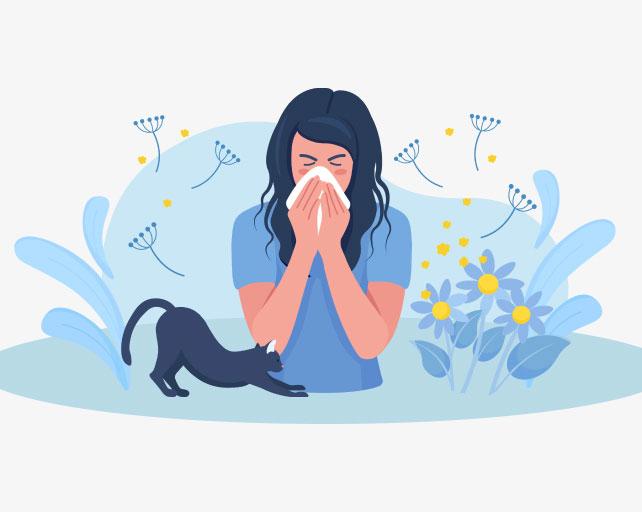8 HVAC Air Filter Myths Debunked
Don’t believe everything you hear about HVAC air filters. America’s Most Trusted® HVAC Brand helps you separate fact from fiction.
From learning about what air filters are and what they do to debunking myths on what matters, we’ve got you covered.
What are HVAC air filters?
HVAC air filters are an air filtration system for your heating and cooling system. Depending on the quality, they can filter out allergens, pollutants, viruses, and more from the air you breathe. They also keep dust, hair, and other particles from building up inside your HVAC system.
You may have an HVAC filter located next to your furnace or air handler, and another filter at a central return air vent in a wall or ceiling of your home. You need to maintain both of these filter systems if you have them both. Clogged filters make your system work harder and less efficiently. Clogged filters can also lead to system breakdowns, resulting in the need for AC repair or furnace repair.
Unfortunately, there is a lot of misinformation out there about HVAC air filters. Today, we’re going to spend some time debunking the myths.
Myth #1: Fiberglass filters are sufficient if changed regularly
Is there really a difference in HVAC air filters? Yes. There’s the very basic 1” fiberglass filter, the cheapest filter you can buy. And you’ve heard the old saying “You get what you pay for.” You’re not getting much help for indoor air quality or your HVAC system when you buy blue fiberglass furnace filters.
Fiberglass filters are nearly see-through. With a MERV rating of 1-4, they stop only the largest particles from entering your HVAC system and the air you breathe. Smaller particles can pass right through.
Wait, what’s a MERV rating?
MERV is the acronym for Minimum Efficiency Reporting Value. A MERV rating (from 1-16) tells you about an HVAC air filter’s ability to capture particles between .3 and 10 microns. A micron is a very small unit of measurement, equal to one-millionth of a meter.
Dust particles, pet dander, pollen, and other pollutants smaller than you can see are measured in microns. To give you an idea of how small a micron is, a human hair is 50 microns in diameter!
The higher the air filter MERV rating, the more effective the filter is at capturing allergens and pollutants before they can enter your HVAC system. Most experts recommend a MERV rating between 8-13 for residential systems. HEPA filters (MERV 16+) are generally reserved for hospital settings.
Myth #2: Higher MERV ratings for HVAC filters are always better
Not necessarily. Higher MERV filters can restrict airflow. We recommend consulting with your local Trane dealer for recommendations that will improve your indoor air quality without causing your heating and air conditioning system to struggle.
Myth #3: More expensive air filters aren’t worth the money
Do more expensive HVAC filters work? In a word, yes. Pleated filters, electrostatic filters, and HVAC air filters with a higher MERV rating are all more expensive than the basic 1” fiberglass filter. They also all do a better job of filtering out allergens, pollutants, and contaminants.
If you want to breathe cleaner air and keep your HVAC system running efficiently, more expensive air filters can be worth every penny. They can save your family from allergy symptoms and improve your indoor air quality.
Myth #4: Air filters can’t save me money
They can, actually. According to the Department of Energy (DOE), simply replacing a clogged filter with a clean one can lower your air conditioner’s energy consumption by 5-15%. Using less energy means lower energy bills. Keeping dust and other particles out of your HVAC system can also help prevent problems that require HVAC repair.
Myth #5: Frequent HVAC filter replacement reduces the need for furnace tune-ups
While regular HVAC filter changes can help your system run efficiently, you still need to schedule a yearly furnace tuneup (and AC tuneup). Your HVAC system has a lot of moving parts and components that all work together.
It’s important that an HVAC technician check out the system to ensure it’s operating safely with no gas leaks or refrigerant leaks. They will also tighten loose bolts, examine the wiring, clean fans and coils, and check system performance.
Myth #6: It doesn’t matter what size HVAC filter I get
We’ve heard of people buying a filter that’s too large and cutting it down to size (shudder). Or people putting a filter that’s too small in the filter slot and figuring it will be “good enough.” Size matters. Your HVAC system will run most efficiently and your air will be cleaner if you take the time to purchase the right HVAC filter size.
There are two types of HVAC filter sizes - actual and nominal. The actual size reflects the true measurements of an air filter. This is often a very specific number such as 11.5 x 11.5 x .7, whereas the nominal size is rounded up to make the process of buying air filters simpler. In this case, the nominal size would be 12 x 12 x 1 and would be the size you need to purchase.
The filter in your system right now will have the measurements on it. If it fits snugly, that is the size you should purchase. Make HVAC filter replacement easier by stocking up and signing up for automatic shipping with Trane Filters powered by Filter Time.
Myth #7: It doesn’t matter how I put the filter in
Oh, yes it does. Putting the filter in the wrong way will negatively impact the filtration and can negatively impact the efficient operation of your HVAC system.
So, which way does a filter go in? Most HVAC filters on the market today have an arrow on one of the sides. This indicates what direction the filter needs to face.
The arrow should point in the direction that the air is flowing. When you change the AC or furnace filter, make sure the arrow is pointing to the furnace or air handler, and pointing away from the return air duct.
Myth #8: You should replace HVAC filters every 30 days
Not necessarily. Then, how often should air filters be changed? HVAC filters should be replaced when they are dirty. For cheap fiberglass filters, this might be more often than every 30 days, depending on your HVAC system, and whether you have pets, allergies, and more. HVAC air filters with better filtration may only need to be changed every 90 days.
But again, how often to change a furnace filter should be based on the quality of the filter. You should at least check the filter every 30-90 days, depending on the type of filter. Then change it if it’s dirty. New to all of this? Learn how to change an air filter.
Check out our filter maintenance guide for more specific information regarding different filters and systems.
Anne Fonda
Content Writer, Trane Technologies
A Content Writer with Trane Technologies, Anne Fonda researches topics and writes for Trane® and associated residential HVAC brands. She works in collaboration with Trane Technologies subject matter experts, offering easy-to-understand, informative content on complex topics. Her goal is to help consumers make informed decisions on the products and services they need.
She has written for HVAC and other service provider websites for over 16 years. Before transitioning to web content writing, Anne had a 14-year stint as an award-winning journalist. She graduated cum laude from the University of Missouri-Columbia School of Journalism.
When she’s not working, Anne enjoys playing word games, reading, gardening, spending time with family, and visiting gardens and museums.
Expert review by Jennie Bergman Senior Product Manager, Indoor Air Quality




